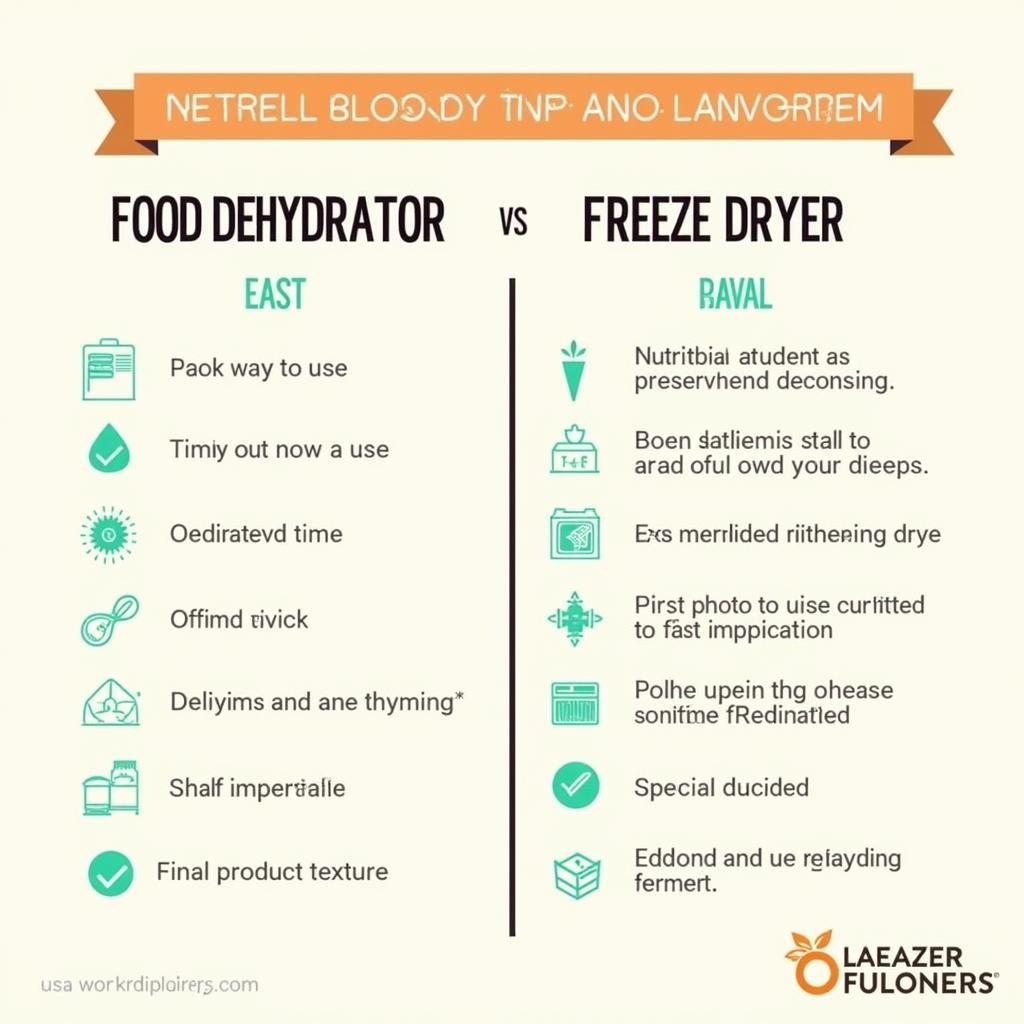Preserving food is an age-old practice, and with modern technology, we now have more options than ever. Two popular choices are food dehydrators and freeze dryers, but which one comes out on top? This comprehensive guide delves into the Food Dehydrator Vs Freeze Dryer debate, exploring their mechanisms, pros, cons, and ideal uses to help you determine the perfect preservation method for your needs. Let’s explore the exciting world of food preservation!
Dehydration: An Ancient Art Made Modern
Dehydration, one of the oldest methods of food preservation, removes moisture from food, inhibiting microbial growth and extending shelf life. Modern food dehydrators utilize gentle heat and airflow to achieve this, transforming fresh produce, meats, and even liquids into shelf-stable goodies. Think jerky, dried fruit, and even fruit leather! They’re all products of dehydration.
Dehydration is relatively affordable and accessible. Dehydrators are generally less expensive than freeze dryers and easier to operate. They’re a great option for beginners or those on a budget. While the process can take several hours, it’s largely hands-off, allowing you to focus on other tasks. The resulting dried foods are compact and lightweight, ideal for camping, backpacking, or simply saving pantry space. However, dehydration does alter the texture and flavor of some foods. They often become tougher and chewier, and some volatile flavors can be lost during the drying process.
Freeze Drying: Preservation Through Sublimation
Freeze drying, also known as lyophilization, is a more sophisticated preservation technique. It involves freezing the food, then subjecting it to a vacuum, which causes the ice to sublimate directly from a solid to a gas, bypassing the liquid phase. This process preserves the food’s original shape, color, and nutritional value to a greater extent than dehydration.
While freeze drying delivers superior results in terms of quality and nutritional retention, it comes at a higher price. Freeze dryers are significantly more expensive than dehydrators and require more technical know-how. The process is also more time-consuming, often taking 24 hours or more to complete. food freeze dryer vs dehydrator offers a quick overview if you’re short on time. However, the end product boasts a remarkable shelf life, often lasting decades if stored properly. Freeze-dried food also rehydrates quickly, regaining its original texture and flavor with the addition of water.
Which Method Is Right for You? Food Dehydrator vs Freeze Dryer: The Showdown
Choosing between a food dehydrator and a freeze dryer ultimately depends on your individual needs and priorities. If you’re looking for an affordable and easy way to preserve food for camping or everyday snacking, a dehydrator is a great choice. However, if preserving the nutritional integrity and original qualities of your food is paramount, and you’re willing to invest more, then a freeze dryer is the way to go.
 Comparison chart highlighting the key differences between a food dehydrator and a freeze dryer
Comparison chart highlighting the key differences between a food dehydrator and a freeze dryer
Frequently Asked Questions
What foods are best suited for dehydration?
Fruits, vegetables, herbs, and lean meats are ideal for dehydration.
Can I dehydrate liquids like soups or sauces?
Yes, you can dehydrate liquids, although the process may take longer.
What are the benefits of freeze drying over dehydration?
Freeze drying retains more nutrients, flavor, and the original texture of the food. It also results in a longer shelf life.
Is freeze drying expensive?
Yes, freeze dryers are generally more expensive than dehydrators.
How long do freeze-dried foods last?
Freeze-dried foods can last for up to 25 years or more if stored properly.
What’s the difference between freeze dried food vs dehydrated food?
Freeze dried food vs dehydrated food provides an in-depth look at the core distinctions.
Can I make liquid tomato food with either method?
Yes, both methods can be used to preserve tomato-based products, although the end result will differ in texture and shelf life.
Conclusion
Both food dehydrators and freeze dryers offer unique benefits for preserving food. Ultimately, the best choice for you hinges on your budget, the types of food you plan to preserve, and the desired shelf life. We hope this food dehydrator vs freeze dryer comparison empowers you to make an informed decision.
Are there other food preservation techniques you’d like to explore? Do you have a favorite recipe using dehydrated or freeze-dried ingredients? Share your thoughts and experiences in the comments below!
Need further assistance? Contact us at Phone: 02437655121, Email: minacones@gmail.com, or visit us at 3PGH+8R9, ĐT70A, thôn Trung, Bắc Từ Liêm, Hà Nội, Việt Nam. Our customer service team is available 24/7.